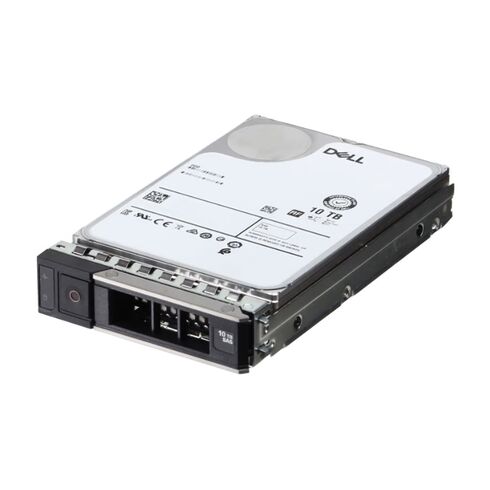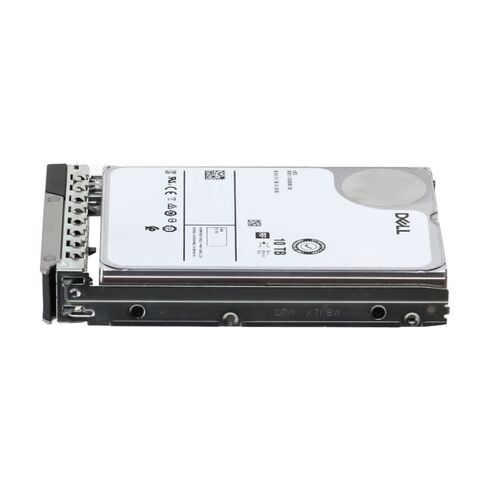WNP7C Dell Server Hard Drive 10TB 7.2K RPM SAS-12GBPS 256MB LFF
- — Free Ground Shipping
- — Min. 6-month Replacement Warranty
- — Genuine/Authentic Products
- — Easy Return and Exchange
- — Different Payment Methods
- — Best Price
- — We Guarantee Price Matching
- — Tax-Exempt Facilities
- — 24/7 Live Chat, Phone Support
- — Visa, MasterCard, Discover, and Amex
- — JCB, Diners Club, UnionPay
- — PayPal, ACH/Bank Transfer (11% Off)
- — Apple Pay, Amazon Pay, Google Pay
- — Buy Now, Pay Later - Affirm, Afterpay
- — GOV/EDU/Institutions PO's Accepted
- — Invoices
- — Deliver Anywhere
- — Express Delivery in the USA and Worldwide
- — Ship to -APO -FPO
- — For USA - Free Ground Shipping
- — Worldwide - from $30
Product Summary
Dell 10TB 7200RPM ISE Near Line SAS Hard Drive
Specifications at a Glance
- Manufacturer: Dell
- Model Number: WNP7C
- Product Type: Hot Plug Hard Disk Drive with Tray
Technical Details
- Storage Capacity: 10 Terabytes
- Form Factor: 3.5 Inches
- Interface Type: SAS 12Gbps
- Cache Memory: 256 Megabytes
- Advanced Format: 512e
- Rotational Speed: 7200 RPM
Performance Metrics
Speed and Efficiency
- Rotational Speed: 7200 RPM
- External Transfer Rate: 1200 MB/s
- Buffer Size: 256 MB
Expansion and Connectivity Options
Interface and Compatibility
- SAS Interface: 1 x SAS 12 Gb/s
- Hot-Swap Compatibility: 1 x 3.5-inch Bay
Supported Systems
Compatible Dell PowerEdge Servers
- PowerEdge R330
- PowerEdge R430
- PowerEdge R530
- PowerEdge R730
- PowerEdge R730xd
- PowerEdge T430
- PowerEdge T440
- PowerEdge T640
Capacity: 10TB
The Dell WNP7C Server Hard Drive boasts an impressive capacity of 10TB, making it an ideal choice for users who require ample storage space for their data-intensive applications and workloads. With this massive capacity, users can store a vast amount of data, including large files, multimedia content, databases, and more.
Benefits of 10TB Capacity
1. Ample Storage: The 10TB capacity ensures that users have more than enough space to store their data without worrying about running out of storage. It is perfect for businesses, organizations, and individuals dealing with large volumes of data.
2. Improved Performance: With a higher capacity, users can store a larger number of files on the hard drive, reducing the need for multiple drives. This leads to better overall performance as data retrieval and access become faster and more efficient.
3. Cost-effective Solution: By opting for a single 10TB hard drive instead of multiple smaller capacity drives, users can save on costs associated with purchasing and maintaining additional hardware. It also reduces power consumption and the need for additional rack space.
Importance of 10TB Capacity
The importance of the 10TB capacity cannot be overstated in today's data-driven world. Here are some key reasons why this feature is crucial:
1. Scalability:
As data continues to grow exponentially, having a high-capacity hard drive like the Dell WNP7C becomes essential for scalability. It allows users to future-proof their storage infrastructure by accommodating increasing data requirements without the need for frequent upgrades.
2. Data Intensive Applications:
Data-intensive applications such as media editing, virtualization, and big data analytics require massive storage capabilities. The 10TB capacity enables users to run these resource-intensive applications seamlessly without worrying about storage limitations.
3. Data Redundancy:
With a 10TB hard drive, users can create redundant copies of their important data for backup and disaster recovery purposes. This ensures that even in the event of hardware failures or data corruption, critical information remains safe and accessible.
Speed: 7.2K RPM
The Dell WNP7C Server Hard Drive offers a remarkable rotational speed of 7.2K RPM, delivering exceptional performance and data transfer rates for demanding applications. This high-speed capability makes it an excellent choice for users who require fast and efficient data access.
Benefits of 7.2K RPM Speed
1. Faster Data Access: The 7.2K RPM rotational speed ensures that data is read from and written to the hard drive at a rapid pace. This translates to quicker access times, reduced latency, and improved overall system performance.
2. Enhanced Workload Performance: Applications that rely heavily on accessing and processing large amounts of data, such as databases and virtualization environments, benefit greatly from the faster speeds provided by the 7.2K RPM hard drive. It enables smoother operation, faster data retrieval, and better response times.
3. Seamless Multitasking: The high rotational speed allows users to perform multiple tasks simultaneously without experiencing significant performance degradation. Whether it's running multiple virtual machines or editing high-resolution videos, the 7.2K RPM speed ensures smooth multitasking capabilities.
Importance of 7.2K RPM Speed
The importance of the 7.2K RPM speed cannot be overlooked when considering a server hard drive. Here are a few reasons why this feature is vital:
1. Improved Productivity:
Fast data access and transfer speeds provided by the 7.2K RPM hard drive contribute to enhanced productivity. Users can complete tasks more quickly, leading to increased efficiency and reduced waiting times.
2. Reduced Downtime:
In time-sensitive environments, such as online transactions or real-time analytics, minimizing downtime is critical. The 7.2K RPM speed ensures that data can be accessed and processed swiftly, reducing the risk of delays and system bottlenecks.
3. Compatibility with RAID Configurations:
The 7.2K RPM speed is commonly preferred in RAID configurations due to its balance between performance and cost-effectiveness. It allows for optimal data striping and redundancy, resulting in improved fault tolerance and data protection.
Interface: SAS-12GBPS
The Dell WNP7C Server Hard Drive features a SAS-12GBPS interface, offering high-speed data transfer capabilities for efficient communication between the hard drive and the server. This interface ensures seamless integration and compatibility with various server architectures.
Benefits of SAS-12GBPS Interface
1. Faster Data Transfer: The SAS-12GBPS interface enables rapid data transfer rates, significantly reducing the time required for tasks such as backups, data replication, and file transfers. It ensures that data-intensive operations can be completed swiftly and efficiently.
2. Enhanced Scalability: With the SAS-12GBPS interface, users can easily expand their storage infrastructure by adding additional hard drives or connecting to external storage systems without compromising performance. This scalability is crucial for growing businesses or organizations dealing with ever-increasing data demands.
3. Reliability and Data Integrity: The SAS interface offers advanced error detection and correction capabilities, ensuring data integrity during transmission. It provides a reliable and secure connection between the hard drive and the server, minimizing the risk of data loss or corruption.
Importance of SAS-12GBPS Interface
The SAS-12GBPS interface plays a vital role in server storage solutions. Here are some reasons why this feature is important:
1. Compatibility:
The SAS-12GBPS interface is widely supported by server hardware and operating systems, ensuring seamless compatibility and integration. It allows users to easily connect the Dell WNP7C hard drive to their existing infrastructure without the need for additional adapters or converters.
2. Enterprise-class Performance:
For enterprise environments where reliability, performance, and data security are paramount, the SAS-12GBPS interface offers optimal performance. It is commonly used in mission-critical applications where uninterrupted operation and high data availability are essential.
3. Future-proofing:
The SAS-12GBPS interface provides a future-proof solution by offering compatibility with upcoming technologies and higher-speed SAS versions. Users can invest in the Dell WNP7C with confidence, knowing that it will support their storage needs for years to come.
Cache: 256MB
The Dell WNP7C Server Hard Drive is equipped with a generous 256MB cache size, enhancing its performance by storing frequently accessed data closer to the processor. This feature allows for faster data retrieval and reduced latency, resulting in improved overall system responsiveness.
Benefits of 256MB Cache
1. Accelerated Performance: The large cache size of 256MB enables the hard drive to quickly access frequently used data, reducing the time required for read and write operations. It results in faster application loading times, improved multitasking capabilities, and overall system acceleration.
2. Efficient Workload Management: The cache helps optimize workload management by intelligently storing and prioritizing data based on its frequency of access. This ensures that commonly accessed files or applications are readily available, minimizing delays and bottlenecks.
3. Enhanced Data Integrity: With a larger cache, the hard drive can temporarily store data during power fluctuations or sudden system shutdowns. This feature, known as write caching, improves data integrity by ensuring that information is safely written to the storage medium without the risk of corruption or loss.
Importance of 256MB Cache
The significance of the 256MB cache cannot be understated when considering a server hard drive. Here are a few reasons why this feature is important:
1. Improved Responsiveness:
A larger cache size translates to improved responsiveness and smoother user experience. Whether it's launching applications, accessing files, or running resource-intensive tasks, the 256MB cache ensures fast data retrieval and reduced wait times.
2. Efficient Resource Utilization:
The cache helps reduce the load on the server's main memory by storing frequently accessed data closer to the processor. This frees up system resources for other tasks, resulting in improved overall system performance and resource utilization.
3. Reliable Data Storage:
By temporarily storing data in the cache before writing it to the storage medium, the 256MB cache ensures that there is no loss of data in case of unexpected power failures or system crashes. It adds an extra layer of protection and reliability to critical data.
Form Factor: LFF
The Dell WNP7C Server Hard Drive comes in a Large Form Factor (LFF) design, making it suitable for servers and storage systems that require larger physical drive sizes. The LFF form factor provides increased storage density and allows for easy installation and maintenance.
Benefits of LFF Form Factor
1. Higher Storage Density: The LFF form factor allows for larger drive sizes, enabling higher storage density within the server or storage system. This is especially beneficial for environments where space is limited or where a large amount of data needs to be stored in a compact footprint.
2. Easy Installation and Maintenance: The larger physical size of the LFF hard drive simplifies installation and maintenance procedures. It provides more space for connectors and cooling mechanisms, making it easier to connect and manage the drive within the server chassis.
3. Scalability and Flexibility: With the LFF form factor, users can easily add or replace drives as their storage needs evolve. This scalability and flexibility allow for future expansion without requiring significant hardware modifications or system downtime.
Importance of LFF Form Factor
The importance of the LFF form factor should not be overlooked when considering a server hard drive. Here are a few reasons why this feature is important:
1. Optimal Airflow and Cooling:
The larger physical size of the LFF hard drive allows for better airflow within the server chassis, ensuring efficient cooling and reducing the risk of overheating. It helps maintain optimal operating temperatures, which is crucial for reliable and long-lasting performance.
2. Compatibility and Standardization:
The LFF form factor is widely supported by server manufacturers and is considered a standard in many enterprise-level systems. This ensures compatibility and easy integration with various server architectures, reducing the risk of compatibility issues or limitations.
3. Longevity and Investment Protection:
The LFF form factor has been in use for many years and is expected to remain relevant for the foreseeable future. By choosing a hard drive with this form factor, users can ensure that their investment is protected and that replacement drives will be readily available in the future.













